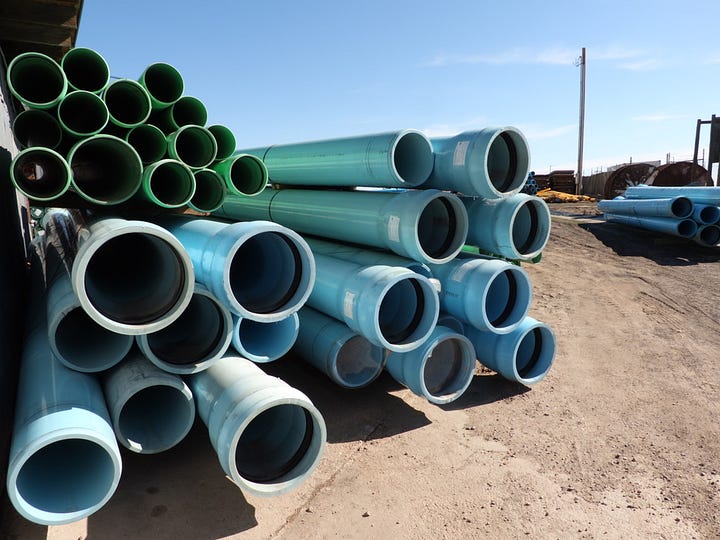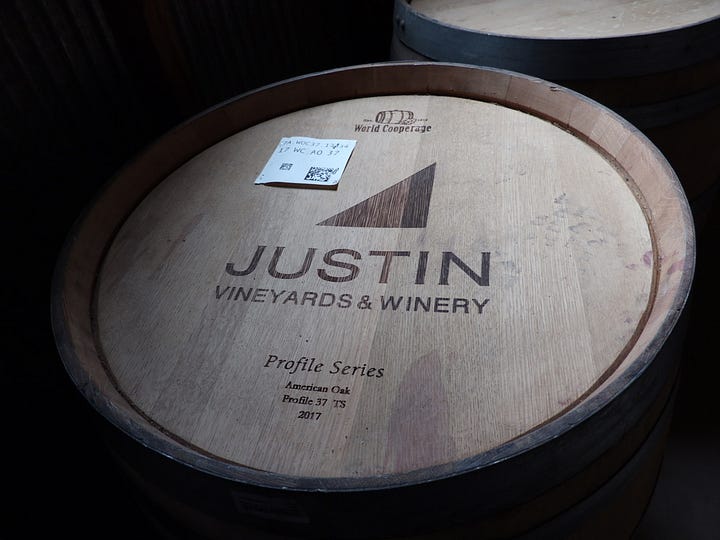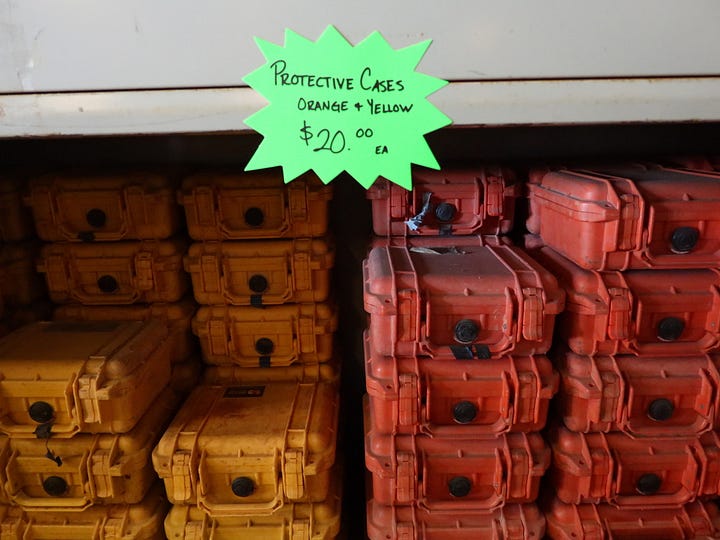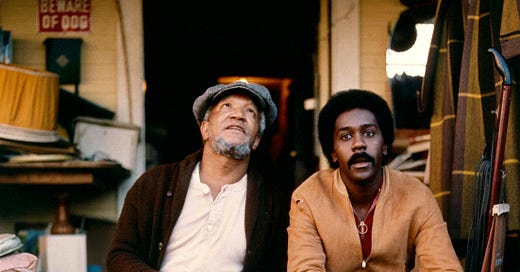Sam Bankman-Fried awaits trial. Elizabeth Holmes awaits prison.
Unlike those two, Damon Carson didn’t go to Stanford. He went to Oklahoma Baptist University. He didn’t dabble in fake blood-testing machines or (allegedly) move investor money around in a major crypto fraud.
He’s also not going to jail. Instead, Damon is making millions of dollars getting his hands dirty with real things in the real world. At the same time, he’s keeping tons of material out of landfills.
Damon created Repurposed Materials, an unsexy name for an unsexy business, but it hauled in a very sexy $7 million in sales last year. As I walked through one of the company’s facilities outside Denver, I saw this was not your typical junkyard. There were no old, rusty cars or washing machines. There was no Fred Sanford arguing with Lamont.
Instead, there were reams of used billboard vinyl, piles of carpet samples, stacks of large PVC pipes, racks of glass, and an entire wing devoted to used barrels from Justin Winery in Paso Robles.
All of this could end up in the landfill, but Damon won’t let that happen. “We’re kind of an industrial Cupid,” he tells me. He buys this stuff and resells it to someone who could use it. “Last year we kept 16 million pounds out of the landfill, and our goal this year is to keep 20 million.” (Quick tapping into calculator… that’s 8,000 tons saved from the trash heap in 2022.)




The profit margins can be amazing. For example, when Frontier Airlines stopped showing inflight movies (because of course it did), the airline sold Repurposed Materials two million pairs of earbuds for $800. Damon says he resold them to a company that refurbishes iPhones for third-world countries… for $50,000.
It’s the more creative reuses, however, that get my attention, like the seatbelt webbing Damon sold to a body bag manufacturer during Covid because the guy needed more bag handles ASAP. I saw old fire hoses in the corner— one trucker bought some to thread chains through so the chains wouldn’t scratch anything when thrown over a load. My favorite story is the person who bought large plastic covers that had been used to protect computer servers and turned them into camp showers.
Most of us don’t think this way. We don’t look at fire hoses and wonder, “What could I use that for?” But that’s how everyone used to think, and many people still do. “Your parents, grandparents, lived through the Great Depression,” Damon tells me. “Those of us who travel to third world countries see that repurposing is alive and well to this very day.”
From Portable Toilets to an Industrial Thrift Store
Damon has always been attracted to the underbelly of the business world. His early entrepreneurial enterprises included owning portable toilets, a laundromat, a company that sold old kiddie rides, and a trailer park. He says these were businesses where “there’s not a lot of Harvard and Stanford MBAs running around.”
Twenty years ago he opened a traditional trash company serving construction sites around Colorado ski resorts. He saw a lot of perfectly good material being thrown away. He eventually sold the trash company, but he kept thinking about the construction waste. Some of that stuff was brand new.
In 2010, he had his “Reese’s moment, when chocolate hits the peanut butter.” A subcontractor said to him, “If you ever get a chance to buy an old advertising billboard vinyl like you see on our highways… they make a great drop cloth for painting.’”
Soon Damon and his wife launched Repurposed Materials with their own money. His first purchase was 20 advertising billboard vinyls for $140 that he immediately resold on Craigslist.
The vinyls are still a staple for his company. They are often repurposed as large tarps, or as lining for outdoor ice skating rinks and fish ponds.
Damon buys a lot of that used vinyl from Newman Signs in Jamestown, North Dakota. “We were saving these vinyl materials,” says Jim Englund, head of Newman’s operations. He heard about Damon a decade ago from a local farmer who was buying old vinyl from Repurposed Materials to cover hay and cattle feed. Jim reached out, and Damon offered to buy the vinyl and truck it away. It’s been a win-win ever since. Jim makes a little money, and “it’s nice to know the vinyls are going to use.”
Cowboy Engineer
Damon’s best customers are businesses with less than $50 million in sales who are used to McGyver-ing solutions and aren’t afraid to take risks. “I think there’s some correlation — ‘some’ being an understatement — between entrepreneurship and repurposing,” he says, “because you’re hands-on, you’re creative, you’re thinking outside the box.”
He calls them “cowboy engineers,” and he’s happy they still exist. “In our land of abundance, that resourceful, that ingenious, that innovative gene has kind of been bred out of us.”
Here are two of his favorite examples.
Damon bought two truckloads of large concrete pads from Comcast, pads the company ran cable through in subdivisions. He soon sold all of them to a freight trucking company. The owner planned to put the blocks inside half-empty trucks as ballast to keep them from being blown over in windstorms while driving between Colorado and Wyoming. “It was an instant solution,” Damon says.
Then there were the massive military parachutes originally used to drop large cargo like Humvees. Damon bought the military surplus and sold it to an oil and gas pipeline company up in the Arctic. The company needed the parachutes to cover dump trucks to keep them from freezing. “They put a propane Salamander heater under the truck, and that parachute just blows up like a hot air balloon, and it becomes about 60 degrees.”
“You Can Go Broke Buying Deals”
Not every purchase is a winner. Three years ago Damon bought a bunch of unused pads that go under air-conditioning units. It seemed a bargain at the time. “We thought, ‘Well, it’s generic, versatile and adaptable,’ three words we use a lot.”
The pads are still sitting in his Texas warehouse. He can’t find a buyer. It’s a good reminder that bargains don’t always pay off. “We have to curate our inventory very carefully,” he tells me. “I had a salvage trader tell me early on, ‘Just remember you can go broke buying good deals.’”
That said, Repurposed Materials continues to grow, with revenues jumping 50% last year. Damon recently opened a sixth warehouse — this one in Ohio — and he claims he now has a facility within an 8-hour truck drive of most of the U.S. population.
He continues to buy unusual items in large quantities. When we spoke, Damon had just taken possession of 660,000 unused syringes from the state of Oregon (probably for Covid vaccines that no one ever received), as well as 200,000 pounds of train axles from Brazil that were rejected because they had some rust spots. “Somebody can easily polish these…they’re gonna get rusty over time anyhow,” he says the original buyer told him, but the buyer still demanded new ones. So Damon took the old (new) ones.
His biggest challenge is getting the word out. The company spends a lot on marketing. “My guess is only one to two percent of America probably ever heard of our company.” Damon can only imagine how much more trash he could keep out of landfills if people knew there was a Craigslist for big stuff in large quantities.
He’s also become a motivational speaker, spreading the gospel of repurposing and entrepreneurialism. “I started this company when I was in my 30s,” Damon says. “I tell my own children who are in their 20s, ‘You don’t have to have it all figured out. It took me a while to figure out where my talents and my interests and my passions best fit.’”
I’m still trying to figure that out for myself.
♺ ♺ ♺ ♺ ♺
This story contains everything I love about covering business. It’s unique, weird, profitable, and does some good. More of this, please.







I have so much respect for people with this kind of vision. A little jealous, I guess.🥴
He's every farmer and rancher's dream. They're masters at engineering new inventions out of old junk.